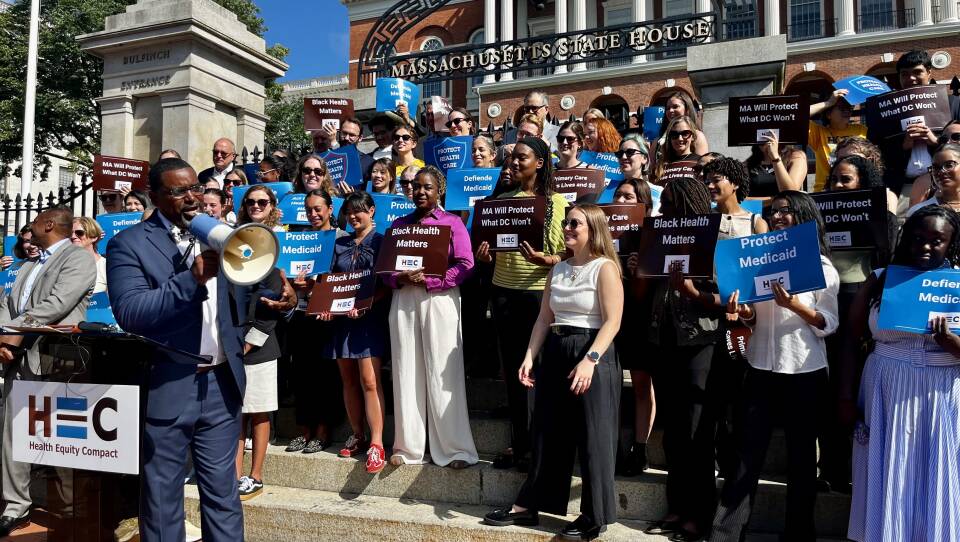Backers of state legislation proposing a broad approach to closing gaps in health care access and outcomes say now is the time for Massachusetts to double down on its commitment to health equity.
Members of the Health Equity Compact, a group of leaders of color from across the health care realm, rallied outside the State House Tuesday before making their case inside the building to lawmakers holding a hearing on the bill.
They pitched their bill as the next step for a state that has paved the way on health care reform and a way to push back against Medicaid spending cuts and other federal policy changes that could ripple through the medical system.
“For the folks in my family who are dying [disproportionately] of diabetes and heart disease and cancer, I have an imperative to show up in this building and be part of this movement,” said Michael Curry, president and CEO of the Massachusetts League of Community Health Centers. “This is not just about policy for policy’s sake. This is about demanding, urging legislators, to address the inequities I grew up in and see when I go home.”
Speakers at the rally cited the 23-year difference in life expectancy between Roxbury residents and their and their wealthier neighbors in the Back Bay.
“That is a systemic failure,” Roxbury Sen. Liz Miranda said. “And you know how I know it’s real? Every day on Facebook or every day in my community, we’re losing people in their 40s, we’re losing people in their 50s, way before their prime.”
Miranda said Black Massachusetts residents experience higher rates of diabetes, high blood pressure, stroke, mental health challenges, HIV diagnoses and birth complications, while also being less likely to have a consistent source of health care.
To chip away at some of those disparities, the bill proposes a number of strategies.
It would expand MassHealth coverage to people who are currently ineligible because of their immigration status, and require insurers to reimburse for health care support services like language interpretation, patient navigation and community health workers.
The legislation, filed by Lawrence Sen. Pavel Payano, Springfield Rep. Bud Williams and Chelsea Rep. Judith Garcia, seeks to help bring more doctors to high-needs areas. It also proposes a new state office of health equity and calls for the creation of statewide equity goals, to measure progress in eliminating gaps.
The bill is also backed by the advocacy group Health Care for All, whose executive director, Amy Rosenthal, told lawmakers Tuesday that the proposal includes measures that would promote a strong and diverse health care workforce.
She said more than 40% of Massachusetts residents report challenges accessing care, with higher rates reported among Hispanic, Latino and low-income residents.
The Massachusetts Association of Health Plans flagged that some aspects of the bill — like a requirement that insurers reimburse for certain telehealth visits at the same rates as in-person care — have the potential to drive up costs.
“While MAHP strongly supports the goals of advancing health equity and addressing longstanding disparities, we urge caution in advancing the bill in its entirety, particularly at a time when significant cuts to federal health care funding threaten to undermine the state’s Medicaid program and reduce access to care for the very communities these reforms aim to support,” Lora Pellegrini, the association’s president and CEO, said in a statement.
Curry, of the Mass. League of Community Health Centers, said the legislative process will give different groups a chance to hash out their perspectives.
“There’s a resistance because of the cost, but what has to counterbalance that is the cost of saving lives,” he told GBH News.
Curry said the Health Equity Compact looks to bring various interests to the table together.
“Maybe we don’t get the whole loaf, but if we can negotiate 80% of the loaf and address the life expectancy difference between Back Bay and Roxbury, we can address high rates of morbidity and mortality, we’ve won,” Curry said.





